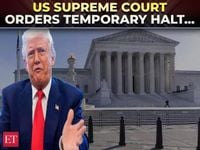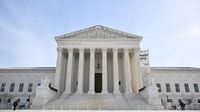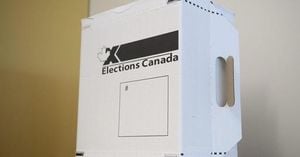The U.S. Supreme Court temporarily halted the deportation of Venezuelan migrants early Saturday, April 19, 2025, in a significant ruling that has drawn attention to the use of a rarely invoked wartime law. The court's decision came after an emergency appeal from the American Civil Liberties Union (ACLU), which argued that the Trump administration was moving to deport Venezuelans without proper judicial review.
In a brief, unsigned order issued around 12:55 a.m. (0455 GMT), the justices directed the government not to remove any member of the group of detainees at the Bluebonnet Detention Center in Anson, Texas, until further notice. This ruling effectively paused the deportations that had been scheduled for that day, as more than 50 Venezuelans were reportedly set to be flown out of the country, likely to El Salvador.
Conservative Justices Clarence Thomas and Samuel Alito publicly dissented from the decision, emphasizing the contentious nature of this legal battle. The ACLU had previously filed petitions in multiple courts, asserting that immigration authorities were preparing to restart deportations under the Alien Enemies Act of 1798, a law that has only been invoked three times in U.S. history, most recently during World War II.
The situation escalated dramatically on April 18, 2025, when ACLU attorneys filed emergency petitions after receiving reports that detainees were being informed of their imminent deportation. Lawyers argued that many detainees had not been given the opportunity to challenge their removals in court. In one instance, a detainee, known by the initials F.G.M., was reportedly instructed to sign a removal waiver in English, despite not being fluent in the language.
Lee Gelernt, the lead ACLU attorney on the case, expressed relief at the Supreme Court's decision, stating, "These men were close to spending their lives in a horrific foreign prison without ever having had any due process." The ACLU's emergency filings highlighted the urgency of the situation, noting that immigration officers were allegedly loading detainees onto buses, presumably bound for the airport.
Judge James Wesley Hendrix, who oversees the case in Texas, had previously declined to issue a broader order to halt deportations, citing the lack of immediate action from immigration authorities. However, the ACLU's filings included sworn declarations from immigration lawyers indicating that their clients were at risk of deportation.
In a related development, the Trump administration has faced scrutiny for its use of the Alien Enemies Act, which allows for the expedited removal of individuals deemed to pose a threat to national security. The law has been criticized for its potential to bypass due process rights, particularly for vulnerable populations such as asylum seekers.
As the legal battle continues, the ACLU is also seeking a nationwide order requiring the government to provide 30 days' notice to anyone facing removal under the Alien Enemies Act. This move aims to ensure that individuals have the opportunity to contest their deportations before they occur.
The Supreme Court's ruling arrives amid a broader conversation about immigration policy in the United States, particularly under the Trump administration. Critics have raised concerns about the administration's aggressive stance on immigration, citing instances of deportations that have occurred without proper legal processes.
Since March 15, 2025, the Trump administration has reportedly sent five flights carrying deportees to El Salvador under a deal with President Nayib Bukele, which allows the U.S. to send individuals identified as gang members to the country's prison system. This arrangement has drawn condemnation from human rights advocates, who argue that it exposes deportees to inhumane conditions.
As the situation unfolds, the ACLU and other advocacy groups are closely monitoring the treatment of Venezuelan migrants and the implications of the Supreme Court's decision. The legal landscape surrounding immigration policy remains contentious, with ongoing debates about the balance between national security and the protection of individual rights.
In conclusion, the Supreme Court's temporary halt on deportations reflects the complex interplay between immigration enforcement and civil liberties. As the ACLU continues its legal efforts, the fate of many Venezuelan migrants hangs in the balance, underscoring the urgent need for a humane and just immigration system.







